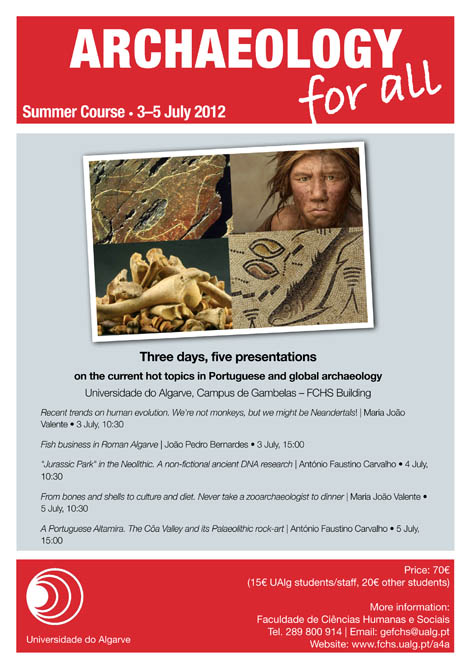 «Arqueologia para Todos/Archeology for All» é o nome do curso de verão que a Universidade do Algarve organiza, no seu Campus de Gambelas (Faro) entre 3 e 5 de julho.
«Arqueologia para Todos/Archeology for All» é o nome do curso de verão que a Universidade do Algarve organiza, no seu Campus de Gambelas (Faro) entre 3 e 5 de julho.
Serão três dias com cinco apresentações sobre os principais tópicos atuais da arqueologia do Algarve e global, sob coordenação da professora Maria João Valente.
O curso dirige-se ao público em geral e aos estudantes, e será todo apresentado em inglês. «Esta edição, que nós esperamos que seja a primeira de muitas, focará alguns dos principais tópicos atuais da arqueologia do Algarve e global», salienta a coordenadora.
Assim, irá falar-se sobre «as tendências recentes sobre a evolução humana, os estudos de zooarqueologia, o comércio romano de peixe no Algarve, a análise de ADN aplicada à arqueologia do Neolítico e a arte rupestre do Paleolítico».
Em cada apresentação, os professores – Maria João Valente, João Pedro Bernardes e António Faustino Carvalho – irão usar multimédia e documentação de suporte (mapas, ilustrações e fotografias), para explicar os tópicos arqueológicos. Material de referência será fornecido, permitindo aos participantes aprofundar os seus conhecimentos sobre o tema, se o desejarem.
Cada apresentação dura duas horas e meia. O curso terá lugar no Campus de Gambelas da Universidade do Algarve, no edifício da FCHS, sala 2.35.
As inscrições custam 70 euros (preço para o público em geral), 15 euros (Para estudantes e funcionários da Universidade do Algarve) e 20 euros para outros estudantes). A organização explica que grande parte destas quantias será usada para pagar os livros e outros materiais educacionais de arqueologia.
Mais informação: Telefone 289 800 914, email: [email protected] ou no site da FCHS da Universidade do Algarve.
Programa:
July 3rd, 10:30 – 13:00
Recent trends on human evolution. We’re not monkeys, but we might be Neandertals!
Maria João Valente*
After decades of research and discussion, it seems that we might have been descendants of Neandertals all along. We recently learned that our most ancient African ancestors are more numerous, intriguing and complex than originally thought. And that the oldest European humans were already experienced with crisis, facing extinction many times before success. These are a few of the recent trends in human evolution.
July 3rd, 15:00 – 17:30
Fish business in Roman Algarve
João Pedro Bernardes*
Fish “negotium” was one of the most important activities in Algarve during Roman times (1st to 5th century AD). Fishery and fish transformation, which would be exported to all Roman world, is well attested in the archaeological record of Algarve, through dozens of piscatory sites along the coast. This presentation will mainly focus on the organization of these sites, the transformed products and their trade.
July 4th, 10:30 – 13:00
“Jurassic Park” in the Neolithic. A non-fictional ancient DNA research
António Faustino Carvalho*
A famous 1993 film, “Jurassic Park”, centers on a fictional island where a billionaire philanthropist and a team of genetic scientists have cloned dinosaurs after recovering and deciphering their DNA. Less than 20 years later, the science fiction is real: it is now possible to recover and decipher DNA from ancient remains. This newly emerged science, “Palaeogenetics”, provides essential data on how agriculture, invented in the Near East ten thousand years ago, spread into Europe, and what kind of social and kinship relations were practiced by the early farming communities. Examples from the Near East, Germany and Portugal will be presented as case studies.
July 5th, 10:30 – 13:00
From bones and shells to culture and diet. Never take a zooarchaeologist to dinner
Maria João Valente*
What is a zooarchaeologist? What can we learn from old bones and shells? In this presentation we’ll cover the major objectives of zooarchaeology, from general material identification to data recording on ancient diets and environments. And why a zooarchaeologist will always look different to a dinner plate.
July 5th, 15:00 – 17:30
A Portuguese Altamira. The Côa Valley and its Palaeolithic rock-art
António Faustino Carvalho*
Questions of antiquity and authenticity were raised in the mid-19th century when the rock-art of the Spanish cave of Altamira was discovered. After decades of scientific debate, Palaeolithic rock-art and cave art were finally thought to be one and the same thing. One hundred years later, the accidental discovery of the Côa rock-art, in Portugal, also raised questions about its antiquity. Threatened by the building of a huge dam, this vast complex of open air rock-art was extensively studied and saved from destruction, and its Palaeolithic age was clearly demonstrated. The aim of this lecture is to present this remarkable archaeological heritage and its scientific importance.
(*) All the presenters are professors at the Universidade do Algarve.


















Comentários